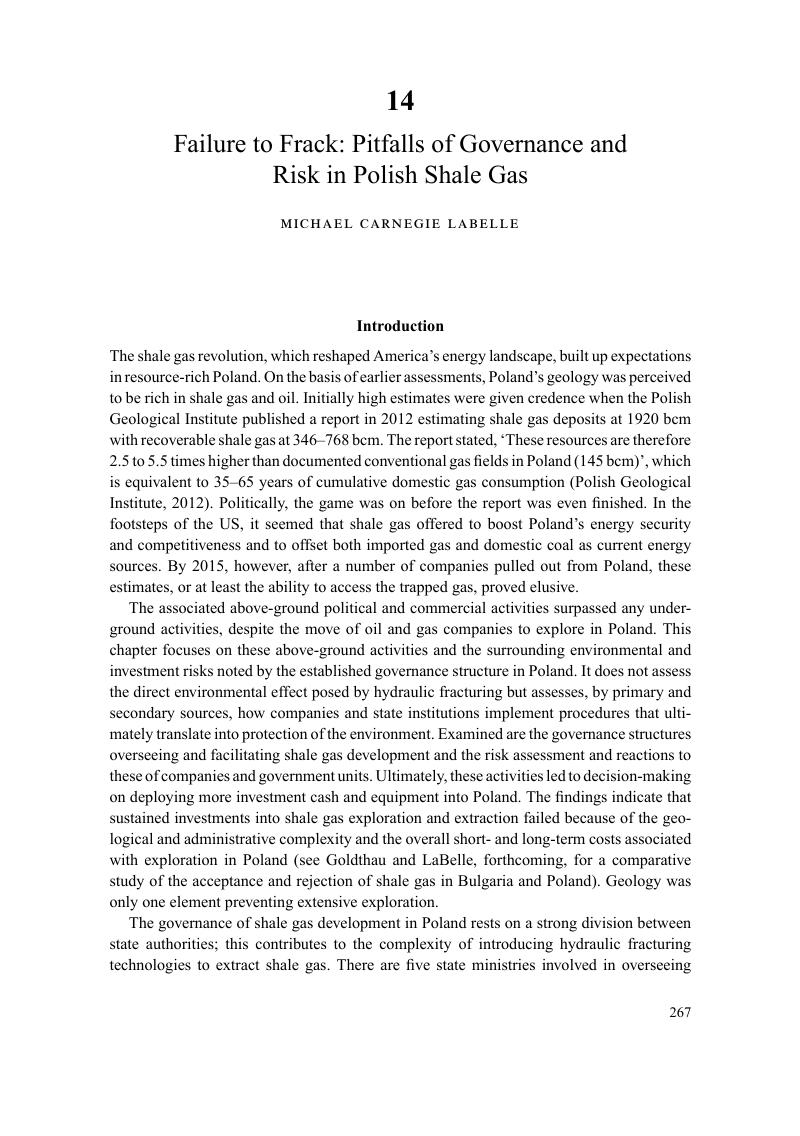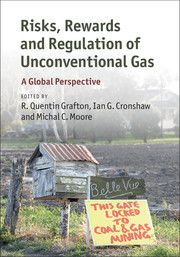Book contents
- Risks, Rewards and Regulation of Unconventional GasA Global Perspective
- Risks, Rewards and Regulation of Unconventional Gas
- Copyright page
- Contents
- Contributors
- Foreword
- Preface
- Acknowledgements
- 1 The Rise of Unconventional Gas: The Story So Far
- 2 Geopolitical Dimensions of Global Unconventional Gas Perspectives
- 3 Unconventional Gas Development in Asia–Pacific: Looking for Common Ground
- 4 Unconventional Hydrocarbons and the US Technology Revolution
- 5 Risks and Opportunities of Unconventional Natural Gas: Australia and the United States
- 6 Economics of Shale Gas in the United States
- 7 Unconventional Natural Gas in China
- 8 The Argentinian Approach for Developing Unconventional Gas Resources
- 9 Unconventional Gas in the United Kingdom
- 10 Alberta Natural Gas – Landlocked Largesse
- 11 Managing the Regulatory Risk of Unconventional Natural Gas
- 12 Regulation of Unconventional Gas in Colombia
- 13 Regulation of Unconventional Gas in India
- 14 Failure to Frack: Pitfalls of Governance and Risk in Polish Shale Gas
- 15 Unconventional Gas Regulation in Australia and the US: Case Studies of Four Jurisdictions
- 16 Regulation of Unconventional Hydrocarbons in Alberta, Canada
- 17 When Unconventional Becomes Conventional: Regulation of Natural Gas Development in British Columbia, Canada
- 18 Leading Practice Regulation for Unconventional Reservoir Development in South Australia
- 19 Best Practice for Community Engagement: Determining Who is Affected and What is at Stake
- 20 Managing the Impact of Coal Seam Gas Water Extraction in the Surat Basin
- 21 Whole-of-Landscape Assessment and Planning in the Management of Unconventional Gas Exploration and Production in Australia
- 22 Unconventional Energy in British Columbia: A Post-Tsilhqot'in View
- 23 Fugitive Emissions from Coal Seam Gas Production
- Appendix: Units
- Glossary and Acronyms
- Index
- References
14 - Failure to Frack: Pitfalls of Governance and Risk in Polish Shale Gas
Published online by Cambridge University Press: 21 January 2017
- Risks, Rewards and Regulation of Unconventional GasA Global Perspective
- Risks, Rewards and Regulation of Unconventional Gas
- Copyright page
- Contents
- Contributors
- Foreword
- Preface
- Acknowledgements
- 1 The Rise of Unconventional Gas: The Story So Far
- 2 Geopolitical Dimensions of Global Unconventional Gas Perspectives
- 3 Unconventional Gas Development in Asia–Pacific: Looking for Common Ground
- 4 Unconventional Hydrocarbons and the US Technology Revolution
- 5 Risks and Opportunities of Unconventional Natural Gas: Australia and the United States
- 6 Economics of Shale Gas in the United States
- 7 Unconventional Natural Gas in China
- 8 The Argentinian Approach for Developing Unconventional Gas Resources
- 9 Unconventional Gas in the United Kingdom
- 10 Alberta Natural Gas – Landlocked Largesse
- 11 Managing the Regulatory Risk of Unconventional Natural Gas
- 12 Regulation of Unconventional Gas in Colombia
- 13 Regulation of Unconventional Gas in India
- 14 Failure to Frack: Pitfalls of Governance and Risk in Polish Shale Gas
- 15 Unconventional Gas Regulation in Australia and the US: Case Studies of Four Jurisdictions
- 16 Regulation of Unconventional Hydrocarbons in Alberta, Canada
- 17 When Unconventional Becomes Conventional: Regulation of Natural Gas Development in British Columbia, Canada
- 18 Leading Practice Regulation for Unconventional Reservoir Development in South Australia
- 19 Best Practice for Community Engagement: Determining Who is Affected and What is at Stake
- 20 Managing the Impact of Coal Seam Gas Water Extraction in the Surat Basin
- 21 Whole-of-Landscape Assessment and Planning in the Management of Unconventional Gas Exploration and Production in Australia
- 22 Unconventional Energy in British Columbia: A Post-Tsilhqot'in View
- 23 Fugitive Emissions from Coal Seam Gas Production
- Appendix: Units
- Glossary and Acronyms
- Index
- References
Summary

- Type
- Chapter
- Information
- Risks, Rewards and Regulation of Unconventional GasA Global Perspective, pp. 267 - 285Publisher: Cambridge University PressPrint publication year: 2016



